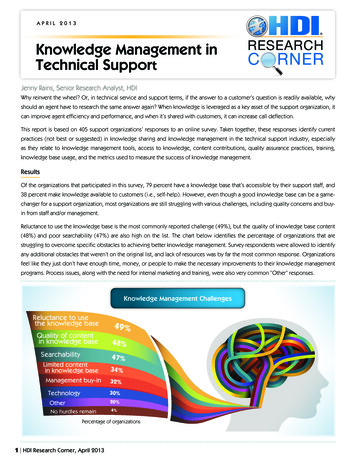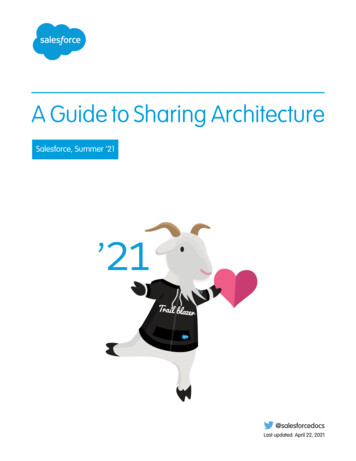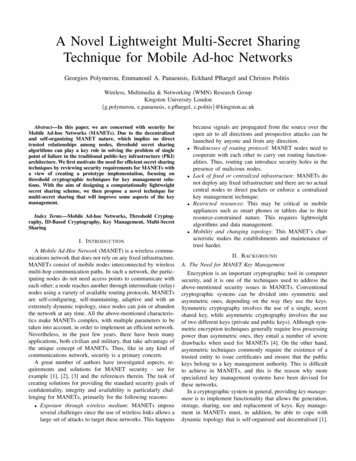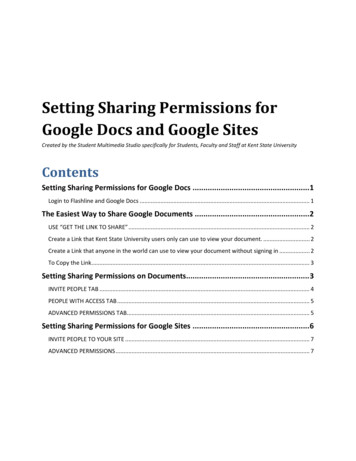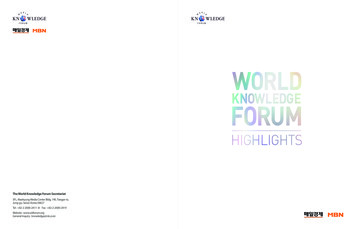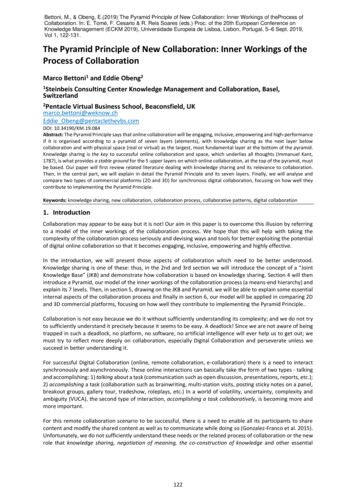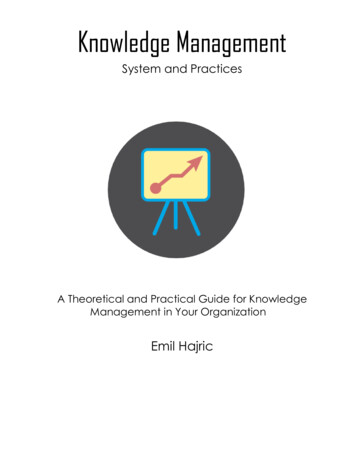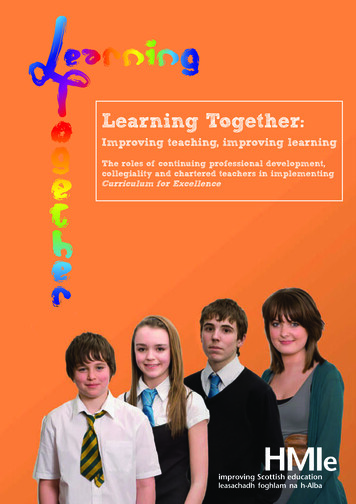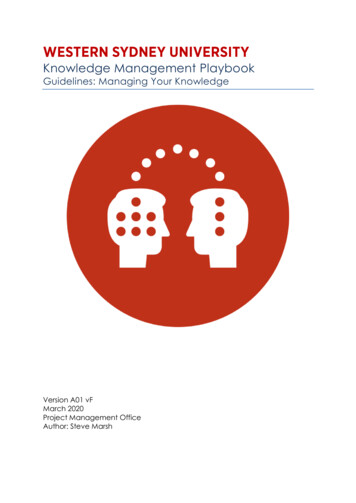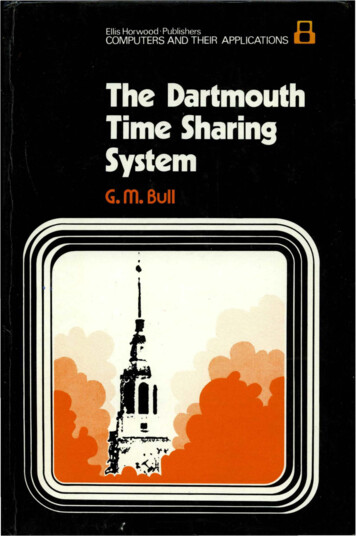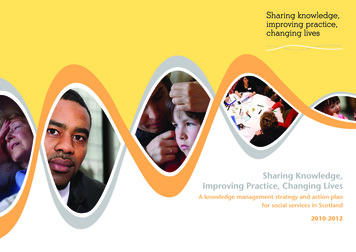
Transcription
Sharing Knowledge,Improving Practice, Changing LivesA knowledge management strategy and action planfor social services in Scotland2010-2012
Produced by NHS Education for Scotland Knowledge Services and the Institute forResearch and Innovation in Social Services (IRISS) in partnership with the Social ServicesManaged Knowledge Network, March 2010. NHS Education for Scotland and IRISS.
Sharing Knowledge, Improving Practice, Changing LivesContentsForeword2Overview4Key messages6Introduction7What is knowledge management?8Knowledge management and Changing Lives9Strand two: sharing knowledge with service usersand carers: creating personalised social services1415What will this mean for me?Strand three: managing knowledge to supportsustainable service change1617What will this mean for me?Strand four: building a collaborative nationalKnowledge management supporting leadership,knowledge infrastructureresearch and continuous learning10How will the strategy be delivered?11What will this mean for me?How can I get involved?181920Strand one: managing knowledge to buildworkforce capacity1213What will this mean for me?1www.ssks.org.uk
Sharing Knowledge, Improving Practice, Changing LivesForewordfrom Adam Ingram Minister for Children and Early YearsSharing knowledge,improving practice,changing livesKnowledge management underpins the delivery of the ScottishGovernment’s social care policies. Access to knowledge, and theskills to use that knowledge effectively, are essential to realisingthe benefits to people’s lives which we aim to achieve.In particular, effective use of knowledge is central to realisingthe vision set out in Changing Lives of person-centred socialservices, delivered in partnership with service users and carersby a confident and competent workforce. It complementsand underpins other products of Changing Lives, such as theContinuous Learning Framework, guidance on the role of theChief Social Work Officers, the Practice Governance frameworkfor social work services and it will help us to deliver our aims inthe early years framework, where a knowledgeable, highly skilledworkforce is key to transforming outcomes for children andfamilies.www.ssks.org.uk2As the Minister with responsibility for social work servicesI welcome this knowledge management strategy for Scotland.It demonstrates the importance of translating knowledge intopractice to transform care and support. It recognises the role ofknowledge in empowering the workforce, service users and carerswith the resources, skills and confidence to ask questions, findand share knowledge, and use it as a vital part of day-to-day workand learning.The strategy features three principal work strands. Encouraging social service employers to develop and leadon knowledge management strategies, as part of a nationalnetwork. Providing the workforce with a range of on-line knowledgeservices and training in information skills, to support themwith their day-to-day work and learning. Improving access to information for service users and carersand facilitating sharing of information between practitioners,service users and carers.These work strands aim to ensure that knowledge is easilyaccessible when and where people need it, and that it becomesan integral part of delivering social services. This will require
Sharing Knowledge, Improving Practice, Changing LivesIt is essential that this strategy and its recommendations areimplemented locally and nationally. That is why we haveset up a Social Service Managed Knowledge Network andSteering Group to oversee progress across the country andto share experience in improving knowledge managementlocally. This agenda will be supported by Social ServicesKnowledge Scotland, the new national online knowledgeservice, available to all social services staff.a shift in how social service practitioners, managers andemployers work and think. It also requires the promotionof skills in accessing and using knowledge to enable theworkforce to deliver the right care and support at the righttime, based on evidence and best practice.This strategy has been developed jointly by the Institute forResearch and Innovation in Social Services (IRISS) and by NHSEducation for Scotland Knowledge Services.It demonstratesthe benefits of sharing information and learning resources andtechnology across the health and social service sectors. Thissharing of knowledge and learning across organisations andsectors will help to deliver continuity of care, ensuring carejourneys are as straightforward and smooth as possible.The strategy builds on Scotland’s strong tradition of puttingknowledge to work to deliver the best quality care andsupport for vulnerable people. I believe that it provides thenecessary infrastructure to make this happen, through socialservice organisations, practitioners and managers, serviceusers and carers coming together to share knowledge, toimprove practice and to change lives.Social services staff will require strong support and leadershipfrom their employers to make this happen. This strategy aimsto support organisations in developing strategies, identifyingknowledge champions and where appropriate, ChiefKnowledge Officers, to provide leadership, vision and impetusfor translating knowledge into practice. They will promotethe cultural change required at strategic level, to ensure thatknowledge is embedded in social service practice and helpto fulfil the aspirations of Changing Lives and the Early Yearsframework.Adam IngramMinister for Children and Early YearsMarch 20103www.ssks.org.uk
Sharing Knowledge, Improving Practice, Changing LivesOverviewwww.ssks.org.ukKnowledge management is about getting the rightThe Strategy and Action Plan, Sharing Knowledge, Improving Practice,information to the right people at the right time. ThisChanging Lives, has been developed by NES (NHS Education Scotland) andKnowledge Management Strategy and Action Plan has beenIRISS (Institute for Research and Innovation in Social Services). It responds todeveloped to help individuals and social services organisationsthe Report of the 21st Century Social Work Review, Changing Lives, which setthroughout Scotland to access, share and use knowledge.out a future vision for future social services in which staff, people who useThis is important to prevent individuals and organisationsservices and carers are using different sources of knowledge in their day-to-dayreinventing the wheel rather than sharing what they know.lives and for making decisions. A more detailed version of the Strategy can beUsing what you know is fundamental to improving outcomesfound at http://www.ssks.org.uk/km-strategy.aspx; this document provides afor people who use services and carers.summary of the key elements.4
Sharing Knowledge, Improving Practice, Changing LivesThe Strategy has three components. network to support the vision and action planSocial Services Knowledge Scotland (SSKS), a gateway onthe web to a range of information, learning resources and tools for sharing knowledge systems and methods to support individuals andorganisations to use knowledge to support servicedeliveryA network of organisations known as the Social ServicesManaged Knowledge Network (MKN) how organisations can collaborate within a national how knowledge management helps to build capacity forpersonalised services.A programme to develop people’s skills in accessing,sharing and using knowledge (often referred to asThese activities will support the development of a competent,information literacy).confident and valued workforce, as well as servicemodernisation and sustainable redesign.It responds to the changing context of social services bydefining: a vision for knowledge management becoming anintegral part of the delivery of social services5www.ssks.org.uk
Sharing Knowledge, Improving Practice, Changing LivesKey messages1. The purpose of the Knowledge Management Strategyand Action Plan is to help our sector to manage andshare knowledge in order to improve outcomes forpeople who use services and carers.4. In a climate of financial constraint, IRISS and NES willwork with partners to maximise use of Social ServicesKnowledge Scotland.5. Development of information literacy will empowerpractitioners, people who use services, and carers, to askquestions, find, share and use information.2. The vision is to:Empower organisations, staff, people who use services,and carers, with resources, skills and confidence to askquestions, find and share knowledge and use it as a vitalpart of day-to-day work and learning in social services.6. This will help to: build capacity for personalised services develop a competent, confident workforce andvalued workforce3. Social services organisations will work together as anational network to help to realise this vision. support sustainable service modernisation andredesign.www.ssks.org.uk6
Sharing Knowledge, Improving Practice, Changing LivesIntroductionThe purpose of the Strategy and Action Plan is to show how a vision for knowledge management becoming an integralpart of delivery of social servicesindividuals and organisations can help realise a vision in whichall stakeholders can access, share and use knowledge toimprove outcomes for people who use services and carers. The how organisations can collaborate within a nationalnetwork to support the vision and action planAction Plan will help you consider what your role might be inpursuing this vision. systems and methods to support individuals andorganisations to use knowledge to support service deliveryThis plan describes a knowledge infrastructure that willhelp achieve the goals of Changing Lives. It responds to the how knowledge management helps to build capacity forpersonalised services.changing context of social services by defining:These activities will support the development of a competent,confident and valued workforce, service modernisation andsustainable redesign.7www.ssks.org.uk
Sharing Knowledge, Improving Practice, Changing LivesWhat is knowledge management?Knowledge management is about how people and organisationsaccess, store and organise different sources of knowledge and howthey use it to achieve their goals. There are three key ingredientsfor successful knowledge management. People: require knowledge management skills and anunderstanding of their importance and relevance to daily work Technology: understanding how best to use technology toaccess, organise and share information and knowledge Processes: organisations need to implement processes thatwill make best use of knowledge to support their goals.Knowledge management is about taking decisions based onPEOPLEknowledge, emphasising the role of learning from experience andthe systematic sharing of good practice.PROCESSESSharing knowledge is important in many contexts:TECHNOLOGY between practitioner, people who use services, and carers among practitioners between practitioners and managersFigure 1: Three ingredients of knowledge management within teams of practitioners and managers between organisations in the public, voluntary and privatesectors between social services and health sectors.www.ssks.org.uk8
Sharing Knowledge, Improving Practice, Changing LivesKnowledge management and Changing Lives3. Service development – Ongoing service redesign andThe four key themes of Changing Lives all depend on effectivetransformation are essential to deliver personalisedknowledge management.services. The principles of identifying and sharing1. Developing a whole systems approach – Sharing andknowledge and applying it to practice are integral toapplying knowledge across all social service organisationseffective service improvement. Knowledge managementis crucial in ensuring the adoption of best practice. Sharinghelps find new ways of working and breaks down barriersknowledge effectively across the sector will help to achievebetween different parts of the system.integrated support for people who use services and their4. Personalised services – ‘Personalisation means thatcarers.people become more involved in how services are2. Workforce development – Maximising the knowledgedesigned and they receive support that is most suitedand skills of social services staff depends on equitableto them.’ For workers this means helping people toaccess to the knowledge base, a culture that facilitatestake more control over their own care and support, andsharing of learning and experience, and competence andsharing decision-making with the practitioner. Practitionersconfidence in using knowledge effectively. The routineneed to combine their own practice experience (whatapplication of knowledge to practice will help practitionershas been termed ‘tacit’ knowledge) with other relevantdeliver better support to people who use services andinformation (such as polices and procedures) and evaluatecarers. Knowledge management is also essential init with the service user. For people who use services,encouraging innovation and enabling staff to cope withpersonalisation involves gaining confidence in the basicthe rapid pace of change in their roles and responsibilities.knowledge management skills of asking questions, findingand evaluating information, and sharing it with theirpractitioner.9www.ssks.org.uk
Sharing Knowledge, Improving Practice, Changing LivesKnowledge management supporting leadership,research and continuous learningThe diagram shows how knowledge management providesIMPROVING OUTCOMESFOR INDIVIDUALS ANDCOMMUNITIESthe foundation for continuous learning, research andleadership. Together, these should support the developmentCAPACITY TO DELIVERPERSONALISED SERVICESof the confident, competent and valued workforce heraldedin Changing Lives, and focused on delivering personalisedoutcomes for individuals and communities. Key links hereCOMPETENT, CONFIDENT, VALUEDWORKFORCEinclude the Continuous Learning Framework (CLF) developedby the Scottish Social Services Council (SSSC) and IRISS; theCONTINUOUSLEARNINGleadership programmes building on the Leading to DeliverRESEARCH ANDDEVELOPMENTLEADERSHIPFRAMEWORKinitiative; and the recognition in Changing Lives of theimportance of conducting and applying research to underpinKNOWLEDGE MANAGEMENT STRATEGY AND ACTION PLANsocial services practice. The crucial link between knowledgemanagement and leadership is reflected in the developmentFigure 2: Knowledge management as a cornerstone of social services transformationof the online leadership framework as an integral part of SocialServices Knowledge Scotland.www.ssks.org.uk10
Sharing Knowledge, Improving Practice, Changing LivesHow will the strategy be delivered?The strategy has four strands which cover the three ingredientsof effective knowledge management – organisationalPEOPLEprocesses, technology and people.SKILLS AND VALUES Managing knowledge to build workforce capacity.Communities of practiceInformation literacy and IT trainingKnowledge worker role development Sharing knowledge with people who use services andcarers.ORGANISATIONS Managing knowledge to support sustainable servicechange. Building a collaborative national knowledge infrastructure through organisations (the Managed Knowledge Network)and technology (Social Services Knowledge Scotland).TECHNOLOGYMANAGED KNOWLEDGE NETWORK (MKN)SOCIAL SERVICES KNOWLEDGESCOTLANDCollection of organisations workingtogether to improve the information,learning and knowledge landscapein the social services sectorAn integrated onlineknowledge platformOnline tools for collaborationand sharing knowledgeFigure 3: Organisations, people and technology as themes within this strategy11www.ssks.org.uk
“Sharing Knowledge, Improving Practice, Changing LivesThe social services workforce roles tend to be multidisciplinary, requiring them to have a littleknowledge of a wide range of subjects and therefore they need to be able to access, apply and sharethis knowledge in a timely fashion. However, there is an issue in terms of enabling and facilitating theworkforce to access information, but also to develop the skills for them to evaluate the informationthat they do access in terms of its appropriateness to particular issues that they want to address.Strand One:Managing knowledge to build workforce capacityThe strategy aims to create a confident and competentThe resources to be delivered by this work strand include:workforce, able to ask questions, make decisions based on a programme of work-based information literacy trainingevidence and good practice, share knowledge with colleagues,people who use services and carers, and innovate and adapt in a network of knowledge champions based within social servicesorganisationsresponse to the changing needs of the service. Local cultures“should be developed which value the use of knowledge andThe workforceneed to be inquisitiveand enquiring and beup for the fact that theyneed to be accessinginformation.” tools and resources within Social Services Knowledge Scotland linkedseek to embed it at the heart of practice.with the Continuous Learning FrameworkThis work strand centres on four areas for development: a personal webspace to record personal and professional learning Information literacy - enabling people to define an group learning materials for developing learning communities.information need, find, evaluate, combine and shareinformation, and put it into practice Sharing personal knowledge and experience Facilitating offline as well as online access toinformation and learning Embedding knowledge management in formal andinformal learning – including through the ContinuousLearning Framework promoted by SSSC and partners.Figure 4:Information literacy cyclewww.ssks.org.uk12”
Sharing Knowledge, Improving Practice, Changing LivesWhat will this mean for me?Geoffrey is the manager of a residential childcare unit. As staff have only limited access to one, shared computer,Geoffrey is aware that he has to act as the information provider. This is a role that Geoffrey takes seriously ashe knows that it is crucial that his staff are kept up to date. However, he finds it frustrating that he has to huntabout for information and isn’t very confident in doing so. The idea of news briefings and alerts is one thatappeals to Geoffrey as he would then be able to quickly assess what is new and relevant for his staff without toomuch difficulty.Geoffrey has undertaken the information literacy trainingpractice. Using SSKS he sets up a news alerting service whichprogramme. His organisation offers this course to middlewill email him with updates on topics of interest. To readmanagers to equip them with the skills of finding and sharingmore about these topics he can find full text journal articlesinformation with teams and empowering team memberson SSKS. He selects relevant news summaries to be placedto make better use of information for themselves. He is alsoon the notice board in the staff room or discussed at weeklypart of the national network of knowledge champions andteam meetings as appropriate. Using SSKS as a quality assureddiscusses with them possible solutions to keeping himself andsource, Geoffrey is confident that he is sharing not onlyhis team up to date with new knowledge relevant to theirrelevant but reliable information.13www.ssks.org.uk
Sharing Knowledge, Improving Practice, Changing LivesStrand Two:Sharing knowledge with people who use services andcarers: creating personalised social services two-way, person-centred communication between socialChanging Lives highlights the fact that the 21st century is atime of great choice and opportunity, in which people expectservices staff and and by people who use services or carers.social services to enable them to achieve their goals. EveryoneSharing of knowledge depends on support in askingshould be treated with respect, as individuals with theirquestions and providing information in an accessibleown aspirations, hopes and fears. A personalised approachformatsupports people to make changes, regain their independence developing the information support role of social servicesand fulfil their personal potential.staff at all levels.Partnership and shared decision-making between people whoThe resources to be delivered by this strand include:use services and practitioners are likely to work better if both Information resources for people who use services andparties have access to good quality and reliable informationcarersand knowledge. Support in finding, sharing and using thatknowledge helps to empower people to make decisions, take A framework to develop the information support role ofaction to find their own solutions and to develop self-directedsocial services workerssupport. Training materials to support people who use servicesThis strand focuses on:and carers in developing the information support role ofsocial services staff at all levels. The information support enabling access to quality assured information for peoplerole comprises the workforce skills and values of sharingwho use services and their carersinformation with people who use services and carers, andhelping them to find, evaluate, share and use informationfor themselves.www.ssks.org.uk14“The primary focus (inknowledge management) hasto be on what people do todeliver, personalised, relevant,accessible services. The voiceof the service users has to be areal voice in determining someof that.”
Sharing Knowledge, Improving Practice, Changing LivesWhat will this mean for me?Working in a day care centre, Bev regularly has people coming to her with their bills or prescriptions to askher for further explanation. The relationship that Bev has built up with the service users over time meansthat they trust her and feel relaxed about talking to her about personal matters. On one occasion, Alan askedher why his doctor had changed his prescription from one type of drug to another. All that Bev could do wassuggest that Alan go back and speak to his doctor, only to be told that, ‘I don’t like to ask my Doctor, he’s abusy man and doesn’t need his time taken up with my silly questions. He probably told me anyway and I’vejust forgotten’. Sensing Alan was upset at this suggestion, Bev was questioning her handling of the situation.Bev discusses the incident with her line manager, and theyinformation and in helping service users to ask questions andrealise together that helping people to find information isfind information for themselves. Bev feels much easier in heran intrinsic part of Bev’s role. Bev’s line manager suggestsmind that helping people to find information is a core part ofthat Bev undertakes the information support role trainingher role and that she has the knowledge and skills to do thisprogramme, which focuses on person-centred informationeffectively.literacy. This builds Bev’s skills in finding and sharing15www.ssks.org.uk
Sharing Knowledge, Improving Practice, Changing LivesStrand Three:Managing knowledge to support sustainableservice changeThis strand focuses on developing resources, skills and cultureareas for service modernisation, such as dementia, learningto ensure that knowledge is embedded at the heart ofdisability, children’s residential services, care homes, criminalorganisations, and that knowledge management underpinsjustice, alcohol and addictions, community rehabilitation andthe strategic priorities for modernising social services. This willtelecare. These packages will focus on translating knowledgeenable organisations to use knowledge effectively to supportinto practice to achieve measurable improvement in serviceservice improvement.delivery and service outcomes. They will be developed in“partnership with acknowledged centres of expertise andexperience by including the Centres for Excellence such asStructures and procedures (need to be) created to supportthe Dementia Services Development Centre (DSDC) andlearning, research and development and knowledge sharing’www.ssks.org.uk”STRADA. The packages will include elements from all workstrands in the action plan: gateways within SSKS, informationThe resources to be delivered by this work strand includeliteracy training, development of communities of practice andknowledge management packages to support prioritybuilding on the role of libraries and learning centres.16
Sharing Knowledge, Improving Practice, Changing LivesWhat will this mean for me?Catriona is the commissioner for older people’s services in a remote rural authority. She has a short time toreport to the Senior Management Team on the development of a local dementia strategy for the next three yearsand wants to find out about new ways of supporting people with dementia and their carers. A quick web searchreturns an overwhelming variety of resources. How can she find a way to access evidence she can trust?Catriona logs on to SSKS and finds a topic room for dementia.is established with health and housing colleagues. CatrionaA series of evidence summaries gives her an overview ande-mails them all, giving them details of how to accessenables her to locate resources to compare the effectivenessresources through SSKS and setting up a community ofof different models. At her presentation to the Seniorpractice. One member posts a query to the Dementia ServicesManagement Team there is a lot of interest in pursuing theDevelopment Centre and now the sub-group is linked to ause of telecare as a key element of redesign. A sub-groupnew national telecare network.17www.ssks.org.uk
Sharing Knowledge, Improving Practice, Changing LivesStrand Four:Building a collaborative national knowledgeinfrastructureA collaborative organisational infrastructure for managingParticipating organisations will sign a Memorandum ofknowledgeUnderstanding. A Network Coordinator will take responsibilityfor supporting the development of the MKN by providingA Social Services Managed Knowledge Network (MKN) islearning opportunities, tools and standards for organisationalbeing established to oversee implementation of this strategy.knowledge management.A Managed Knowledge Network (MKN) is a group ofA system-wide technology infrastructure for managingorganisations which undertake to work and learn together to:knowledge promote the uptake and use of information and knowledgeto support a shared vision and values centred on transfer ofSocial Services Knowledge Scotland (www.ssks.org.uk) wasknowledge into practicedeveloped during 2007 as a single, integrated point of accessto information and knowledge. It uses technology provided actively support implementation of a network strategy andby NHS Education for Scotland Knowledge Services to enablework plan designed to support this common visionorganisations to share information and learning resources. share information and knowledge across organisationsIn this way it provides seamless access to selected content continuously improve the management of knowledgefrom the The Knowledge Network (formerly NHS Scotlande-Library), the IRISS Learning Exchange, the Social Carewithin organisations - this involves supporting theInstitute for Excellence (SCIE) and many other sources. It alsodefinition of common standards for knowledgeprovides online community tools to support practitioners,management, and applying these standards withinmanagers and teams to capture and share personal and localorganisationsknowledge and experience through communities of practice. facilitate education and training to improve knowledgemanagement within organisations.www.ssks.org.uk18
Sharing Knowledge, Improving Practice, Changing LivesWhat will this mean for me?As a newly qualified social worker, Andrew sometimes feels overwhelmed with the diversity and complexityof problems he encounters and the questions he is asked by people who use services and by colleagues. Beingnew into the post, most of the questions that are asked are new to Andrew, and reluctant to give the wronginformation, he often calls Jim a fellow social worker to ask for advice. Jim has been a social worker for 15 yearsand has built up a wealth of experience, experience that Andrew doesn’t have.Jim suggests that Andrew uses Social Services Knowledgesolutions that can be combined with the experience of longScotland (SSKS) to join a community of practice whereserving employees. SSKS also provides bite-sized informationnewly qualified social workers come together online to sharesummaries on key topics that Andrew can access himselfexperience and key resources. This helps these newly qualifiedand can also make available to people who use services. Hisstaff to learn from each other, identify new approaches andlearning and development is formalised though supervision.19www.ssks.org.uk
Sharing Knowledge, Improving Practice, Changing LivesHow can I get involved?The scenarios presented throughout this document provideMake use of all relevant knowledge sourcespractical illustrations of how the action plan will support dayConfidence and competence in the use of the knowledgeto day working.sharing technologies available not only through SSKSbut also on other specialist portals will help establish newPromote information literacyorganisational partnerships and a more joined-up approach toIT and information literacy training will become part of day-service delivery.to-day work and learning for social services organisations,including use of Social Services Knowledge Scotland forBecome a knowledge championaccessing evidence and information. As a result staff willThe strategy envisages the emergence of knowledgeregard finding and sharing knowledge as a routine part ofchampions within each organisation to implement theirday-to-day practice. Staff will become increasingly confidentorganisation’s knowledge management strategy. Thesein helping people who use services, and their carers, to askindividuals will support the efficient use of knowledge asquestions, find and evaluate information, and consider theiran integrated part of day-
4 Sharing Knowledge, Improving Practice, Changing Lives www.ssks.org.uk Overview Knowledge management is about getting the right information to the right people at the right time.This Knowledge Management Strategy and Action Plan has been
